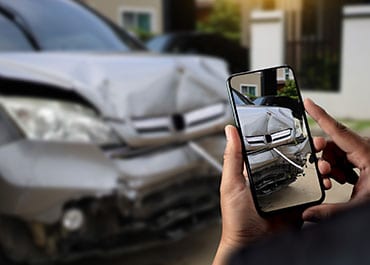Call Now For A Free Case Evaluation(908) 923-0020
Client PortalCall Now For A Free Case Evaluation(908) 923-0020
Client Portal In this article, you can discover…
In this article, you can discover…
The first piece of evidence to collect is photo and video evidence from the accident scene itself. Your smartphone can be used to record images and videos of the vehicles, where the vehicles came to rest, and road conditions.
Next, talk to any witnesses and collect their names, addresses, and phone numbers. This allows your attorney to reach out to them quickly for statements at a later time. A copy of the incident or police report related to the accident should be collected, as well.
Write down the names and addresses of any medical professionals seen after an accident. These days, medical records are electronically available, so it’s advisable to create an online account and access those records via the patient portal.
Be prepared to download the entirety of those medical records and provide them to your attorney. Your attorney can then begin to evaluate your case for possible settlement or litigation.
Taking photographs at the accident scene provides evidence as to exactly what occurred if there’s any question of liability. Photos of damage to your vehicle help provide a clear picture of the extent of damage and the severity of the impact.
At the accident scene, be sure to photograph skid marks, as those can help establish speed as well as liability. Photos of skid marks may also be available as a part of the police report.
Keeping a detailed record of your injuries and symptoms is crucial for accurately comparing your personal records with official medical reports. It’s essential to review your medical records thoroughly and ensure that your doctor documents everything you share with them.
If any symptoms or injuries are left out, be sure to bring them up at your next visit. Make certain that they are included in the doctor’s notes for that visit and reflected in your medical records.
Judges, claims, adjusters, and juries all give strong deference to police reports and the options office reach as to liability. A police officer’s report or option provides evidence that a trained professional came to a decision, perhaps providing the other party with a ticket for reckless driving or failure to yield.
While police reports are not the be all and end all, they can still provide helpful evidence in support of your claim.
Don’t delete any photos or videos related to your personal injury claim or the accident scene, even if they seem minor. Don’t get rid of any evidence that could be helpful, such as the clothes and shoes you were wearing when injured. Retaining all evidence will also help you avoid the accusation of hiding evidence or spoiling evidence, which could reflect on the liability of your case.
Once a case is filed, your attorney can request evidence with a formal letter. Other records may require a notice to produce or a subpoena. Your attorney may also use depositions to gather verbal testimony evidence from witnesses.
For more information on Your Personal Injury Case, an initial consultation is your next best step. Get the information and legal answers you are seeking by calling (908) 923-0020 today.
Copyright©2025, Pezzano Law Group. All rights reserved. Legal Marketing